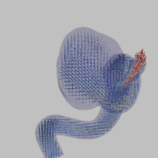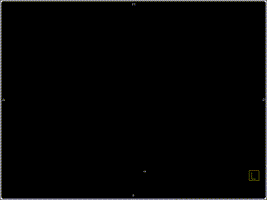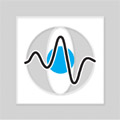
Dipl.-Inf. Jürgen Endres
Alumnus of the Pattern Recognition Lab of the Friedrich-Alexander-Universität Erlangen-Nürnberg
J. Endres, M. Kowarschik, T. Redel, P. Sharma, V. Mihalef, J. Hornegger, A. Dörfler
-
Increasing interest is drawn on hemodynamic parameters for classifying the risk of rupture as well as treatment planning of cerebral aneurysms. A proposed method to obtain quantities such as wall shear stress, pressure, and blood flow velocity is to numerically simulate the blood flow using computational fluid dynamics (CFD) methods. For the validation of those calculated quantities, virtually generated angiograms, based on the CFD results, are increasingly used for a subsequent comparison with real, acquired angiograms. For the generation of virtual angiograms, several patient-specific parameters have to be incorporated to obtain virtual angiograms which match the acquired angiograms as best as possible. For this purpose, a workflow is presented and demonstrated involving multiple phantom and patient cases.



From left to right: real angiogram, visualization of simulated flow velocities, virtual angiogram.
Articles in Conference ProceedingsInvestigating Contrast Settlement Using Virtual AngiographyBildverarbeitung für die Medizin: Algorithmen, Systeme, Anwendungen (Proceedings des Workshops vom 16. bis 18. März 2014 in Aachen), Aachen, 16.-18.03.2014, pp. 282-287, 2014 (BiBTeX, Who cited this?)Journal ArticlesA Workflow for Patient-Individualized Virtual Angiogram Generation Based on CFD SimulationComputational and Mathematical Methods in Medicine, vol. 2012, no. 306765, pp. 1-24, 2012 (BiBTeX, Who cited this?)Articles in Conference ProceedingsInternational Symposium on Biomedical Imaging (ISBI) (From Nano to Macro), Barcelona, 02.05.-05.05.2012, pp. 1200-1203, 2012 (BiBTeX, Who cited this?)
J. Endres, C. Rohkohl, S. Schafer, K. Royalty, A. Maier, M. Kowarschik, J. Hornegger
-
4D digital subtraction angiography (4D DSA) imaging based on C-arm data is compromised by ambiguities due to the lack of sufficient projection data. Furthermore, missing ground truth data complicates the evaluation of reconstructed 4D DSA data sets. In this paper, we present an approach to generate 4D ground truth data and propose a method for iteratively improving 4D DSA reconstructions. The method is evaluated for both ground truth as well as real patient data. For ground truth data, the iterative reconstruction was able to improve the reconstructed data in a way that time-contrast curves (TCCs) are closer to ground truth by 35% on average. Real data showed a more reasonable physiological flow behavior after iterative reconstruction.

Visualization of 4-dimensional DSA data set.
Articles in Conference Proceedings4D DSA Iterative ReconstructionProceedings of the Fully3D (13th International Meeting on Fully Three-Dimensional Image Reconstruction in Radiology and Nuclear Medicine), Newport, RI, 1.6.2015-4.6.2015, pp. 276-279, 2015 (BiBTeX, Who cited this?)

 +49 9131 85 27874
+49 9131 85 27874
 +49 9131 85 27270
+49 9131 85 27270

